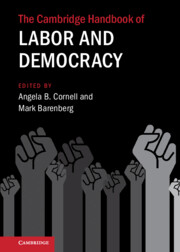Book contents
- The Cambridge Handbook of Labor and Democracy
- The Cambridge Handbook of Labor and Democracy
- Copyright page
- Contents
- Contributors
- Acknowledgments
- Introduction
- Part I Labor and Democracy: Theory and Practice
- Part II History, Politics, and Law
- Part III Labor, Diversity, and Democracy
- Part IV Country and Regional Perspectives
- 14 Labor, Workers’ Rights, and Democracy in Latin America
- 15 African Perspectives on Labor Rights as Enhancers of Democratic Governance
- 16 Why (Which) Workers Often Oppose (Which) Democracy?
- 17 Reclaiming Democracy
- 18 A Critical Assessment of Democratic Labor Unionism in South Korea from a Feminist Standpoint
- Part V Labor and Democracy Sectoral Case Studies: Platform Workers, Higher Education, and the Care Industry
- Index
- References
16 - Why (Which) Workers Often Oppose (Which) Democracy?
from Part IV - Country and Regional Perspectives
Published online by Cambridge University Press: 25 January 2022
- The Cambridge Handbook of Labor and Democracy
- The Cambridge Handbook of Labor and Democracy
- Copyright page
- Contents
- Contributors
- Acknowledgments
- Introduction
- Part I Labor and Democracy: Theory and Practice
- Part II History, Politics, and Law
- Part III Labor, Diversity, and Democracy
- Part IV Country and Regional Perspectives
- 14 Labor, Workers’ Rights, and Democracy in Latin America
- 15 African Perspectives on Labor Rights as Enhancers of Democratic Governance
- 16 Why (Which) Workers Often Oppose (Which) Democracy?
- 17 Reclaiming Democracy
- 18 A Critical Assessment of Democratic Labor Unionism in South Korea from a Feminist Standpoint
- Part V Labor and Democracy Sectoral Case Studies: Platform Workers, Higher Education, and the Care Industry
- Index
- References
Summary
The chapter looks at the relationship between workers and democracy over time, discussing how different workers (skilled and unskilled) relate to three different concepts of democracy (political, egalitarian, and formal-institutional, or Democracy I, II, and III). I argue that while there is a strong link between workers and Democracy I, the association frays with respect to full inclusion of all citizens and the autonomy of institutions. I then reflect on the alternative trajectory of Poland’s Solidarity union: an energetic proponent of Democracy II and III during state socialism, which after the state’s embrace of neoliberalism became a chief supporter of current right-wing efforts to undermine those aspects of democracy. In the end, capitalist societies give many workers “rational” reasons to oppose Democracy II and not care about Democracy III.
- Type
- Chapter
- Information
- The Cambridge Handbook of Labor and Democracy , pp. 263 - 278Publisher: Cambridge University PressPrint publication year: 2022

